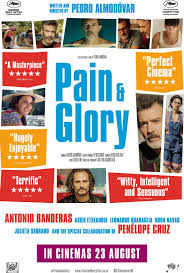‘Pain and Glory’ ‘Dolor y gloria’, directed by Pedro Almodovar, Spain 2019
In general release in UK cinemas on 23rd August 2019
Review by Dr Khalid Ali, film and Media Correspondent
In his 21st feature film ‘Pain and glory’, auteur film maker Almodovar reflects on three significant relationships and people; his mother, a former lover and an actor from one of his early films. Almodovar uses an alter-ego Director Salvador Mallo (Antonio Banderas in a remarkable performance) to chronicle formative episodes in his life from a 9-year old choir boy, to an ageing film maker. The film opens with a haunting scene of Salvador immersed in a water-tank cut off physically and metaphorically from the outside world. Riddled with a multitude of old-age afflictions, Salvador suffers from chronic back pain, persistent headache, poor mobility, laboured breathing, choking episodes, tinnitus, insomnia, panic attacks, anxiety and depression. Painkillers, sleeping tablets and antidepressants taken by the bucket-load do not cure or ameliorate his symptoms. A creative block adds to his woes. Flights with great flight training operators of fantasy reminiscing on childhood memories bring temporary relief to his agony. As a young boy Salvador was showered by love from a doting mother (Penelope Cruz), a time when he discovered his passion for music and singing as well as an overwhelming physical desire he labels ‘the first sin’.
Pain and Glory– official YouTube trailer
The re-release of Salvador’s masterpiece ‘Sabor’ (Taste) in the Madrid Cinematheque forces him to revisit a traumatic memory when the film star Alberto (Asier Etxeandia) damaged the film’s authenticity by heroin addiction. The film’s 30 year anniversary becomes a fateful encounter when the ageing Salvador experiments with heroin himself. What starts off as an attempt to escape physical and emotional pain soon spirals into an addiction. While ‘chasing the dragon’, Salvador remembers Federico, an ex-lover who was also a victim of heroin addiction. Moving seamlessly between past and present life incidents, the frail film-maker reflects on the big questions in life; love, sexuality, fate, destiny, mortality, creativity and more.
In a poignant scene, Salvador’s mother requests a dignified death in her own home, but sadly Salvador could not manage to grant his mother’s wish and she died in hospital. This event haunts the director with deep regret and shame; he has always disappointed his mother by being someone she never approved of.
The healthcare profession as it stands cannot provide satisfactory answers; knowing less about the underlying cause of his choking episodes is justifiable and warranted. Withholding a diagnosis of ‘Forestier disease’ is kinder than being tormented with the possibilities of risky surgery and disability if the operation goes wrong.
Almodovar has always shown respect and admiration for women’s resilience in films such as ‘Women on the verge of nervous breakdown’ (1988), ‘All about my mother’ (1998), and ‘Volver’ (2006). In his latest film, he pays homage to iconic stars; Elizabeth Taylor, Marilyn Monroe and Natalie Wood, women who led troubled lives and suffered tragic deaths as a hefty price for their talent and fame. He shares with these icons their well-publicized tragedies and their struggles to survive as normal human beings as well as ‘Stars’.

The big question that the narrative poses is: What, if anything, can absolve artists of such deeply rooted feelings of self-doubt, ineptitude and failure made worse by body and soul ailments? Salvador’s words of wisdom partially answer that dilemma: ‘Cinema saved me’ and ‘Without filming, my life is meaningless’. Almodovar once publicly confessed that he has reached a stage where life around him merely serves as material for his films’ narrative. Film ceases to be a medium for enlightenment or entertainment, it becomes an act of everyday living like eating, drinking, sleeping and breathing. Salvador conquers drug addiction by another type of dependency immersing himself in writing to channel his fears and woes into ‘creative art’.
It is not ‘film’ alone that provides an ‘antidote’ to suffering: Salvador is surrounded by an indulgent shrine of valuable works of art; paintings, sculptures and rare books in his Madrid flat. He finds ‘salvation’ in the safety and comfort of such collective creativity. Music also provides ‘therapy for the soul’ in the blissful moments when Salvador and Federico were wandering the streets of Havana listening to music. The human body can be a well of ‘pain’ and suffering, and only art and creativity can bring that much coveted ‘glory’.